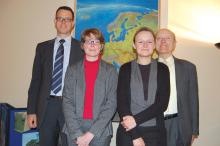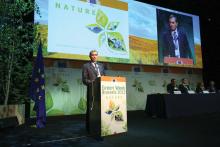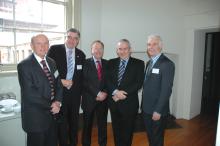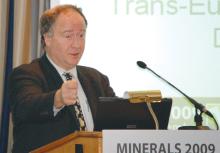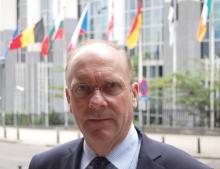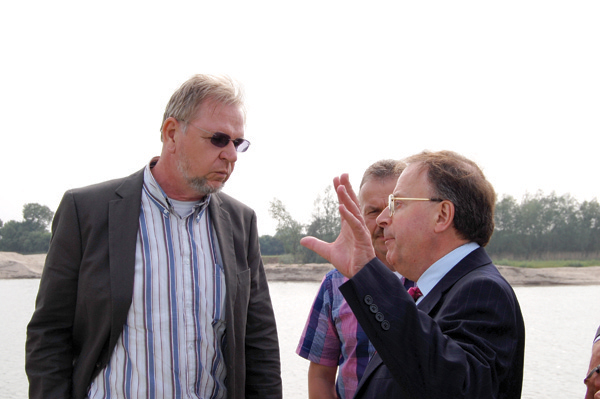
With its 25th anniversary in sight, the European Aggregates Association will have Dirk Fincke as its new general secretary and president Jim O'Brien back for a third year to see the organisation into this new era
Close to the
To help cope with the growing workload this widening brings, Dirk Fincke is to take on the role as general secretary from 1 September this year - the first time the association has had someone full time in this post. To oversee the transition from Antony Fell's part time tenure of the general secretary's position, Jim O'Brien is to extend his presidency for a further year.
"I joined the UEPG in February 2006 as an intern but was offered a permanent position after three months due to my international experience and language skills," explained Fincke. "I started as public affairs officer before being promoted to public affair manager in 2007." German-born Fincke speaks fluent English, French and German.
Fincke studied political science at Bonn University before undertaking a master's degree at the University of Sussex in the UK and continuing his studies at the Sorbonne University in Paris.
In 2002, after graduation Fincke set about establishing Bonn's position on the map as a
"Everyone said it wouldn't fly but it did," said Fincke. "It was very enjoyable work - I have a real interest in international cooperation, whether it is for the United Nations or within the EU, and balancing this framework with the need for languages. It was this interest that drove me to pursue the opportunity to come to Brussels in 2006 and be at the heart of the EU." When Fincke was offered a full-time position with the UEPG he had passed the presidency of BIMUN to someone else, although he did remain on the advisory board for some years after to help with continuity.
"I had no idea about the aggregates industry when I joined the UEPG and although I now have a good understanding of the sector, it is so big that I am always learning," he said. "Continuous learning is part of our obligation as an industry association - to listen to the issues facing members and to learn from best practice." From 1 September 2011, Fincke will take over the role of general secretary of the UEPG - a role that has been undertaken by Antony Fell on a part time basis. Fell was general secretary between 1995 and 1998 when the presidency was held by Tim Ross in the UK and he took on the role again when the Brussels office was set up in 2003. "When I joined the UEPG in 2006, Gregoire Poisson was the only full time employee and I was offered his position when he left the association," explained Fincke.
Today, the UEPG has three full time staff. In addition to Fincke, Miette Dechelle and Sandrine Devos manage public affairs in health and safety and the environment, respectively. Although Antony Fell is stepping down as general secretary, he will remain an EU advisor to the association.
Presidential support The move to having a full-time general secretary is being driven by demand - the association now represents 31 countries across Europe and the workload has grown along with the geographical area that the organisation represents. To help oversee the transition and expansion of the association, current president Jim O'Brien has agreed to stand for a third year.
"Plans to have a three year presidency instead of a two year term were started by my predecessor Denis Mertens," said O'Brien. "It makes more sense to have a three year term - especially now - as it takes a while to get to know the committees and member associations, then time to put plans into action. The extra year makes it possible for me to deliver more." O'Brien said that the last two years have been one of the most exciting chapters in his life. "It has been a pleasure and a positive experience to work with a team and to make a positive impact too," he said.
Looking ahead to his third year of office, O'Brien said that his focus will remain on the raw materials strategy, recycling and biodiversity and how the industry can play a positive role. "I am also still passionate about improving health and safety," he said. "There are so many things going on that we have had to prioritise and focus our objectives." O'Brien will hold the post until May next year but the process to identify and recruit a new president is already underway and he hopes someone will be in position by the end of the year to allow for a smooth handover. "I will miss the challenge but sometimes change is good," said O'Brien. "A new president always brings a new dynamic to the association and stimulates fresh thinking."
Expansion The growth in the association means it can deliver more for its members. "Before the association had to be very generalist as we did not have the capacity but now we have expanded and have the right experience, we can be more focused," said Fincke.
It is worth noting the relative youth of all three full time staff at the UEPG - all are in their early to mid 30s but have all gathered a great deal of experience in the sector. Fincke added that the committee members add significant experience and strengthens the team.
The work the organisation does should also be measured against the budget in which it operates - the association is funded solely by its members with just €450,000 a year to pay for its operation.
In his new position, Fincke has said that his focus will be on the priorities for the UEPG and working with the various committees and board to see what can be achieved and how best to help members.
Part of his focus over the next year will be on organising the delegates assembly in 2012 in Cyprus which will form the central part of the association's 25th anniversary celebrations.
"Although we have been very successful in attracting new member associations in the last year, supporting existing members remains very important to us," explained Fincke. "In the last six months we have reinforced the services offered to our established members." By way of example, Fincke points to a joint presentation at Italy's Samoter construction equipment exhibition with
In talking about his aims in his new role, Fincke also refers to how the challenges facing him are different from those tackled by Fell in his early days. "For Antony, the biggest challenge was the actual formation of the association and getting people to work together," he said. "Initially, the association's headquarters moved with the president but Antony was one of the main people who drove establishment of the permanent Brussels office. He really helped to build the structure that we are now building on." In summing up the changing position of the UEPG in Europe, O'Brien points to the fact that DG Enterprise and Industry and DG Environment now view the association and the aggregates industry as a valued and responsible partner. "In the past, the quarrying sector was very much seen as a problem," he said. "Now they can see that we want to work with them and they like the fact that the association represents so many SMEs across Europe.
"Widening our representation to 31 countries brings new challenges in the terms of workloads and cooperation, but it also adds to the experience and lobbying power of the association."

